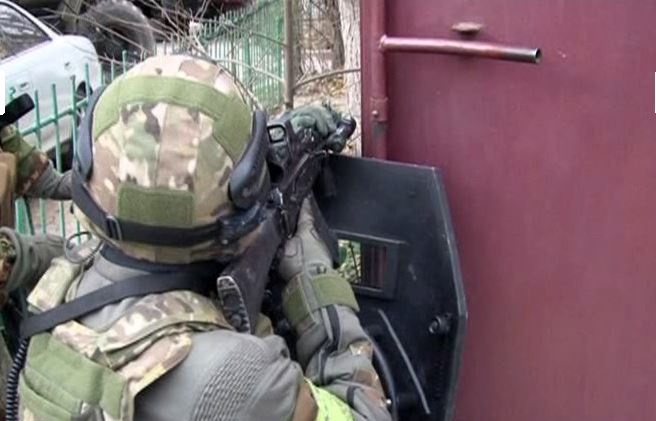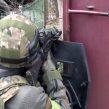
Is Islamic State Operating in Chechnya?
Publication: Eurasia Daily Monitor Volume: 12 Issue: 186
By:

A recent special operation in Grozny against suspected militants of the so-called Islamic State (IS) took Chechnya’s residents and analysts who follow the situation in the republic by surprise. Readers of Chechen ruler Ramzan Kadyrov’s Instagram postings were the first to learn about the incident. For several years now, Kadyrov has used Instagram to communicate with the public. An Instagram posting he published on October 8 said that “the forces of the Interior Ministry, the Federal Security Service (FSB) and the Terek special police unit have neutralized three terrorists at the edge of Staropromyslovsky district of Grozny. We had determined that three militants who had been trained in the camps of the ‘Iblis State’ arrived in the republic” (Ramzan Kadyrov calls the IS the “Devil State”) (Instagram.com, October 8).
According to Kadyrov, the special police unit attempted to arrest one of the suspects near an apartment where his two accomplices were waiting for him. However, the suspect started to shoot at the law enforcers and was killed, Kadyrov wrote. The storming of the apartment where the two other young Chechen suspects were took another hour. The suspects reportedly refused to surrender and were killed. The slain militants were identified as 25-year-old Shamil Chergizov, 26-year-old Zelimkhan Bashanaev, and 25-year-old Magomed Mazaev. News agencies used the name Aslan Baisultanov instead of Bashanaev (TASS, October 8).
According to news reports, three servicemen were injured during the special operation. “Shamil Chergizov was the leader of the gang,” a Chechen interior ministry official was quoted as saying. “He recently returned from Syria. The two other members of the gang—Magomed Mazaev and Zelimkhan Bashanaev—were also members of illegal armed formations. Chergizov was armed with a Stechkin automatic pistol and started shooting at the servicemen, wounding two of them, and was killed by return fire” (Kavkazsky Uzel, October 9).
According to investigators, two of the three suspects, Magomed Mazaev and Shamil Chergizov, were on the Russian federal wanted list, but not on Interpol’s list, as Ramzan Kadyrov had alleged (Kavkazsky Uzel, October 9). Kadyrov claimed that when the apartment was searched after the special operation, government agents found TNT, ammonium nitrate, mines, grenades, machine guns and telephones (Kavkazsky Uzel, October 9).
Kadyrov also asserted that the group planned a terrorist attack on October 5, but that Chechen law enforcement officials “took all the necessary preventive steps, which yielded good results” (TASS, October 8). It is unclear how they were preparing for a terrorist attack on October 5, which is the Day of Grozny holiday, or on October 7, which is President Vladimir Putin’s birthday, if they did not even have their bomb ready. If the suspects came from Syria, they should have been interested not so much in carrying out terrorist attacks, as in setting up a cell and making connections to the remaining rebels in the forests and mountains of Chechnya. Former militants of the Caucasus Emirate pledged allegiance to the Islamic State last summer.
Nevertheless, the news of this incident is interesting in another way. Reports about fighters returning from Syria to Dagestan (see EDM, October 2) were soon followed by reports that people who had fought in Syria under the banner of the Islamic State had appeared in Chechnya. People in Chechnya started talking about a group of militants who had arrived in the republic from Syria at the end of July–beginning of August. At that time, the Chechen authorities, including Ramzan Kadyrov, dismissed those claims as rumors, and Kadyrov insisted that heightened security on the republic’s highways was intended to ensure road safety. “We were forced to intensify the activities of the road police to reduce accidents and deaths on the roads,” Chechnya’s governor said (Rg.ru, August 20). Few people believed this explanation, although locals do worry about the lack of road access. Residents of the republic tried to reassure themselves, recalling that the government always steps up security as holidays approach. At the time, Chechnya was gearing up for celebrations on August 23, marking the birthday of Ramzan Kadyrov’s father, Ahmad-Haji Kadyrov.
The arrests of suspected militants who received training in Syria and their supporters helped to fuel the rumors about the infiltration of militants from the Middle East into Chechnya. Prior to the latest special operation in Grozny, Kadyrov claimed the authorities had arrested three IS members. “One of them was a beginner and two were sympathizers,” Kadyrov said (Ridus.ru, October 2).
Following the incident in Grozny, Kadyrov summoned officials from his administration and republican religious leaders and ordered them to work to expose the criminal ideology of the Islamic State.
The Islamic State poses a danger to the region not because it seeks to connect with local militants who switched their allegiances from the Caucasus Emirate to the IS. The IS has mass appeal for the entire Muslim population of the region. The Caucasus Emirate’s goal was to build an Islamic state in the Caucasus, but the IS organization proposes building an Islamic state for all the world’s Muslims, not just those in the Caucasus.
The special operation in Grozny has exposed the challenge that the Islamic State poses to the government of Russia, but Moscow does not appear ready for it.




